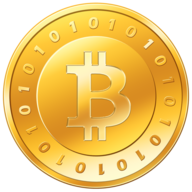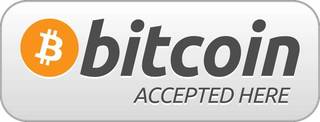






Are Bitcoins The Next Big Online Gambling Frontier?Anonymous Digital Currency Attracting Gamblers From All Over The Globe |
|
|
 When a gambler walks into a casino, they must exchange their cash for chips. In addition to making it mentally easier to gamble, chips provide casino patrons with a unified currency to place bets.
When a gambler walks into a casino, they must exchange their cash for chips. In addition to making it mentally easier to gamble, chips provide casino patrons with a unified currency to place bets.
The same holds true for online gambling, whether it be on poker, sports or other casino games. Of course, converting various currencies into one uniform number requires man hours and cost, meaning that by the time the unit is ready to be wagered, it has already lost some of its value. Processing these these transactions not only hurts the value of a player deposit, but acts as an additional rake that takes huge sums of cash out of the online gambling market.
Enter Bitcoin.
What Are Bitcoins?
Bitcoins were developed in 2009 by an anonymous developer known only as Satoshi Nakamoto as a peer-to-peer, decentralized digital currency. Because banks and other payment processors are circumvented in Bitcoin transactions, the processing fees are almost zero. Additionally, they can be anonymously used all over the world without the need of a daily conversion rate.
There are two ways to earn Bitcoins. You can mine for them, meaning you participate in the checks and balances process of verifying Bitcoin transactions in exchange for a small cut, or you can simply buy them from an e-wallet such as Coinbase or Blockchain. Currently, 1 Bitcoin, or BTC, is worth approximately $113 USD.
The marketplace will cap out in the future at 21 million BTC, though currently, there are about 11 million in circulation. People may use their BTC to buy goods and services (even illegal drugs) across a global marketplace, but unsurprisingly, the very nature of Bitcoins has attracted gamblers as well.
All-In With Bitcoin?
One firm, Lightspeed Venture Partners, estimates that nearly half of all BTC transactions are categorized under gambling.
After Black Friday, getting money onto an offshore online poker site became incredibly difficult for Americans and some sites blocked U.S. players altogether. Most banks refused to process any deposits or withdrawals associated with a gambling site, causing unavoidable delays and shrinking the size of the online poker economy.
In an effort to make it easier to get money online, some sites turned to Bitcoin. WinPoker, a member of the iPoker network, began accepting BTC deposits in March. Switch Poker has been offering BTC options since November of 2011.
Unfortunately, accepting BTC in exchange for USD credit is problematic due to the volatile exchange rate. Another site led by poker pros Bryan Micon and Justin Schwartz, SealsWithClubs, decided to spread anonymous, USA player-friendly, no-limit hold’em exclusively with BTC currency. Players deposit BTC and withdraw BTC, meaning the betting unit value stays constant.
 “We don’t have a bank account at Seals with Clubs,” Micon told NPR. “There’s no bank account. There’s no bank of any sort that we do. We only do this one weird, brand-new, Internet protocol transaction that some of the nerds out there are calling money.”
“We don’t have a bank account at Seals with Clubs,” Micon told NPR. “There’s no bank account. There’s no bank of any sort that we do. We only do this one weird, brand-new, Internet protocol transaction that some of the nerds out there are calling money.”
Of course, anonymous gambling and a lack of government regulation means that BTC online poker could be vulnerable to collusion and other player security issues. The site’s FAQ acknowledges that it is the “wild, wild west of online poker rooms,” adding that the player must accept the risk of using their software. As of August 2013, SealsWithClubs had anywhere from 50 to 300 players using the site at any given time.
A Game Of Dice
Though poker is growing in popularity, the most popular form of Bitcoin gambling is dice, though this isn’t the usual game of craps you may see at your local casino.
A bettor sends their BTC units to one of a number of public addresses and receives either more or less BTC units back in return, depending on the outcome of a game determined by a random number generator. Sites like SatoshiDice, PrimeDice, Just-Dice and others help to facilitate the transactions, or bets, in exchange for a tiny service fee that usually amounts to less than 1 percent.
Players are assured the bets are “100 percent provably fair” because as they say, the numbers don’t lie. Because Bitcoin utilizes open-source software which anybody can review, sites can’t rig the outcome of the game. Each roll is composed of the player’s seed, the server seed and a secret variable. The combination of all three determines winners and losers.
The server seed is random, the player selects their own seed and the secret variable is publicized the next day. Users can simply do the math themselves to verify whether they really won or lost.
In addition to these games of “dice,” players can also use similar algorithms to gamble on Las Vegas-style casino games such as Roulette, Baccarat, Pai Gow, Blackjack and Craps, lotteries or minesweeper.
Take a look at this list of BTC gambling sites that have sprouted up recently.

A Jurisdictional Struggle
Gambling is turning out to be big business in the Bitcoin world and there are now dozens of sites dedicated to it. SatoshiDice was once publicly traded on the MPEX, a BTC stock exchange, before it was privately purchased in July for $11 million USD.
Now the question is, how do various government agencies properly tax and regulate the Bitcoin system? Because the Bitcoin marketplace is self-monitored and maintained by users from all over the globe, it doesn’t fall into any specific government’s jurisdiction.
Although all transactions are completely transparent to anyone willing to look them up, the Bitcoin economy is still mostly anonymous, making it a logistical nightmare for anyone to determine who exactly is profiting and how to tax it.
Outside of one online poker site in Nevada, the current online gambling market in the United States operates in legal grey area. Offshore sites can get away with serving American players, as long as payment processors don’t violate a number of U.S. regulations.
A few BTC gambling sites have avoided unwanted Department of Justice attention by blocking IP addresses from the United States, but anyone with a VPN can find a way to get around the restrictions.
Another issue is the U.S. government failing to acknowledge BTC as legal currency. Though Germany made the leap in August, the U.S. has not. How can a government tax something that they don’t officially recognize? Even Thailand has gone so far as to ban BTC from their Foreign Exchange Commission.
Though the Financial Crimes Enforcement Network has made it clear that regular Bitcoin users aren’t violating any known laws, they determined that those who mine or convert BTC to dollars are subject to Bank Secrecy Act regulations for acting as a “money services business.” The U.S. Treasury then extended its regulations to include BTC processors in an effort to curb money laundering.
 Bitcoin Here To Stay?
Bitcoin Here To Stay?
Bitcoin is becoming increasingly more mainstream in a society hell-bent on ridding itself of physical currency. One Canadian man even listed his house for sale in BTC and a man in Texas sold his Porsche for 300 BTC.
It’s fast, it’s secure, it’s inflation-proof and because it is regulated by other BTC users, transaction fees are just fractions of what they would normally be if processed by a bank.
However, some economists fear that a crash is inevitable given how volatile the Bitcoin market has become. There have been reports of BTC jumping in value to $266 and then down to $105 in a span of just a few hours.
Additionally, one federal judge recently ruled that BTC is real money, which sets a precedent that might force other U.S. officials to take notice. If they do, then taxation and regulation is not far behind, meaning those processing fees are sure to rise.
Still, others tout BTC as the next great international currency. It stands to reason that more offshore online poker sites might begin accepting BTC in an effort to curb the heavy cost associated with other currency exchange rates. Unfortunately, because the BTC exchange rate itself has fluctuated so wildly in recent months, it’s difficult for these companies to effectively price their goods, or in this case, online poker chips, accurately.
Buying $100 worth of online poker chips is one thing, but cashing out a profit only to find that the BTC market has taken a big hit is another. Until the economy can stabilize, savvy poker players will have trouble making the leap into the Bitcoin gambling world.
